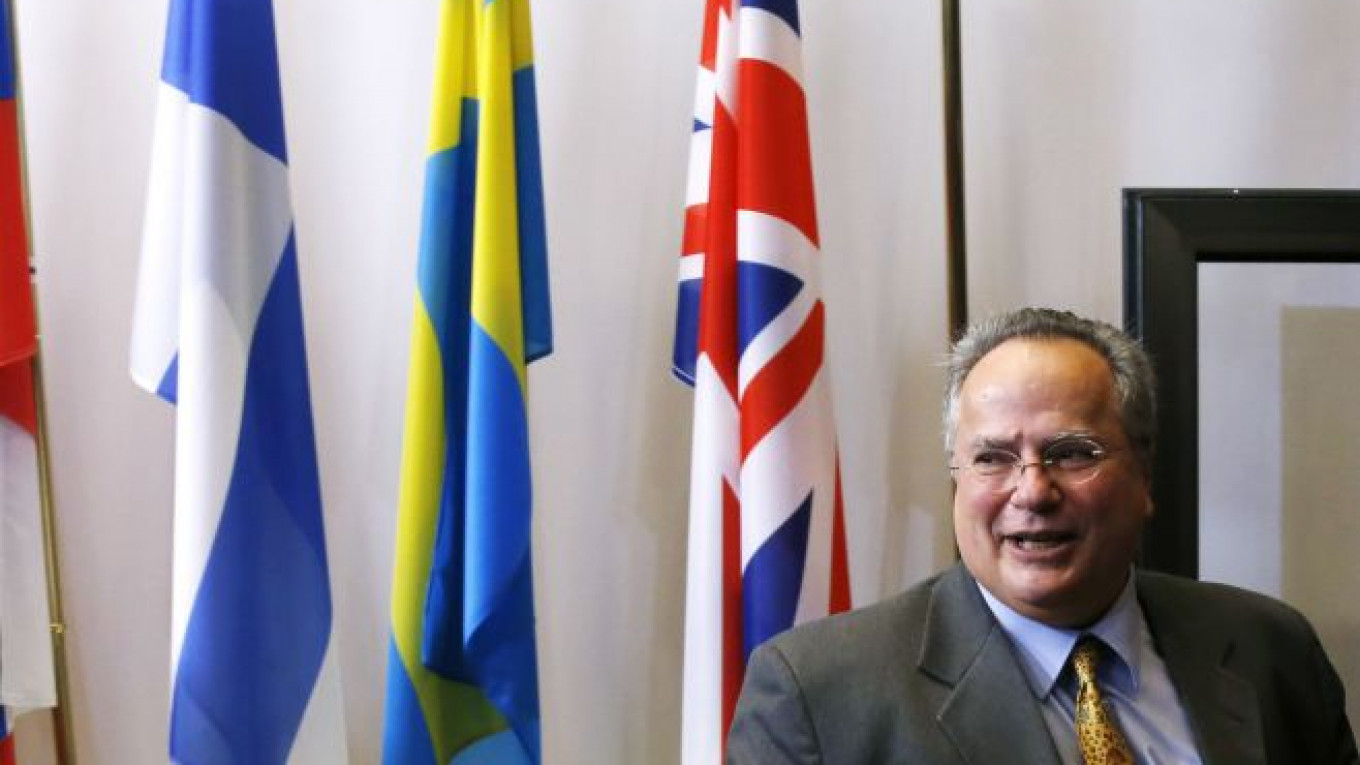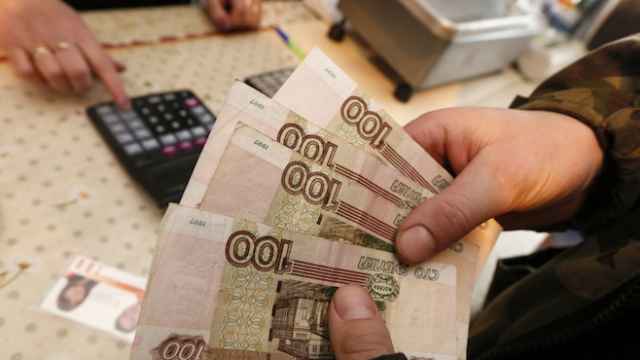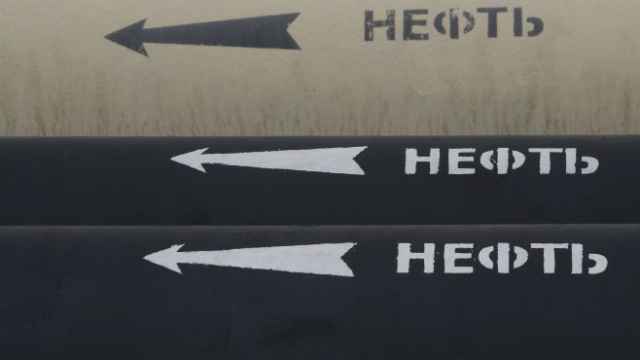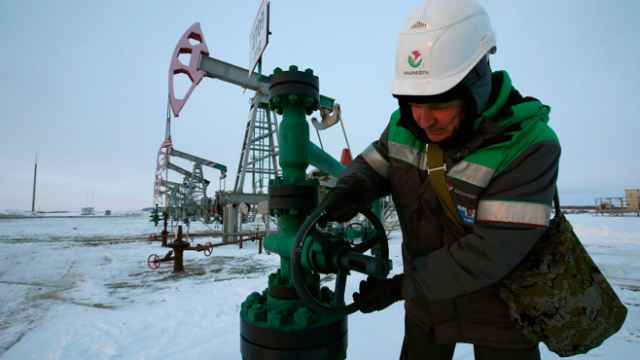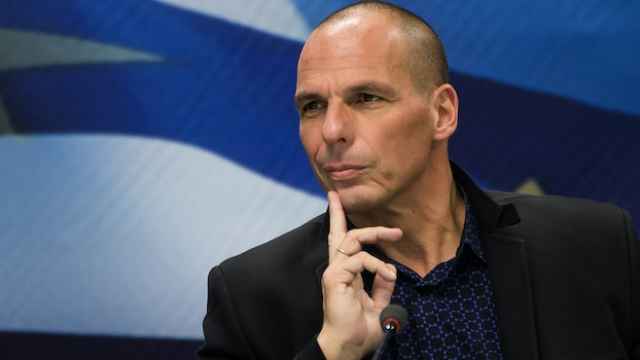European Union foreign ministers extended existing sanctions against Russia on Thursday, holding off on tighter economic measures for now but winning the support of the new left-leaning government of Greece, whose position had been in doubt.
The ministers agreed to extend until September travel bans and asset freezes imposed last year that had been due to expire. They also agreed to list the names of additional people who could be targeted with sanctions when they meet again on Feb. 9.
They dropped language, however, about drawing up "further restrictive measures" that had appeared in a pre-meeting draft. The bloc's foreign policy chief said a decision on such measures would be left to EU leaders meeting next month.
Germany said that decision would depend on the situation on the ground, with any major new rebel advance demanding tougher sanctions.
Thursday's emergency meeting had been called after rebels launched an advance last week, disavowing a five-month-old cease-fire. On Saturday, suspected rebel forces shelled the major port city of Mariupol, killing 30 people. Since then, there has been intense fighting along the frontline, although the rebels appear to have held back from an all-out assault on Mariupol.
Washington, which has coordinated sanctions moves with Brussels in the past year, said it was not planning an immediate new announcement itself.
"Certainly, we welcome it; it's a positive step," State Department spokeswoman Jen Psaki told a regular news briefing.
"This is just a further sign that the actions of the last several days and weeks are absolutely unacceptable and that there will be new consequences put in place," she said.
Psaki noted that the EU and the U.S. sanctions lists had not targeted exactly the same people, firms, or sectors, and added: "We'll continue to consider others that we could add, but I don't think there's anything to expect today."
The run-up to the Brussels talks was dominated by Greece, whose new prime minister, Alexis Tsipras, took power on Monday and complained that his government had not been consulted before tighter sanctions were threatened.
But at the meeting, colleagues said new foreign minister Nikos Kotzias had swiftly dispelled suggestions that Greece would automatically torpedo any sanctions effort.
According to Italy's foreign minister, Kotzias announced to the meeting: "I am not a Russian puppet."
He signed up to a sharply worded statement that declared Moscow responsible for the violence in eastern Ukraine and demanded it halt its backing for the separatists.
Calls for Delay
While the Greeks did call for the decision on tighter sanctions to be delayed, they were not alone: other countries such as Italy and Austria also favored a delay, diplomats said, while Britain and the Baltic states wanted a clearer commitment to imposing new sanctions quickly.
"We are not against every sanction," Kotzias said later. "We are in the mainstream, we are not the bad boys."
German Foreign Minister Frank-Walter Steinmeier expressed frustration with the ambiguity of the Greek position before the talks: "It is no secret that the new stance of the Greek government has not made today's debate any easier," he said. After he met Kotzias in private, German officials said he was less concerned.
Thursday's meeting was the first big test this year of the hard-won unanimity that European officials, led by Germany, had achieved to punish their biggest energy supplier over its actions in Ukraine, which aspires to join the EU.
EU officials said new measures could make it harder for Russian companies to refinance themselves and possibly affect Russian sovereign bonds.
The talks were also Europe's first major contact with Greece's new government, elected on a vow to repudiate the austerity economics championed by Berlin and imposed by Brussels as a condition of a bailout.
Tsipras has not made his position on Ukraine clear in public. His Syriza party has its roots in leftist movements, some of which were sympathetic to Moscow during the Cold War, and Russia's ambassador was the first foreign official Tsipras met after taking office on Monday.
But Greece has also long treasured its membership of the Western NATO alliance. It shares Orthodox Christianity with both Russia and Ukraine, and many Greeks sympathize with both countries.
A Message from The Moscow Times:
Dear readers,
We are facing unprecedented challenges. Russia's Prosecutor General's Office has designated The Moscow Times as an "undesirable" organization, criminalizing our work and putting our staff at risk of prosecution. This follows our earlier unjust labeling as a "foreign agent."
These actions are direct attempts to silence independent journalism in Russia. The authorities claim our work "discredits the decisions of the Russian leadership." We see things differently: we strive to provide accurate, unbiased reporting on Russia.
We, the journalists of The Moscow Times, refuse to be silenced. But to continue our work, we need your help.
Your support, no matter how small, makes a world of difference. If you can, please support us monthly starting from just $2. It's quick to set up, and every contribution makes a significant impact.
By supporting The Moscow Times, you're defending open, independent journalism in the face of repression. Thank you for standing with us.
Remind me later.


